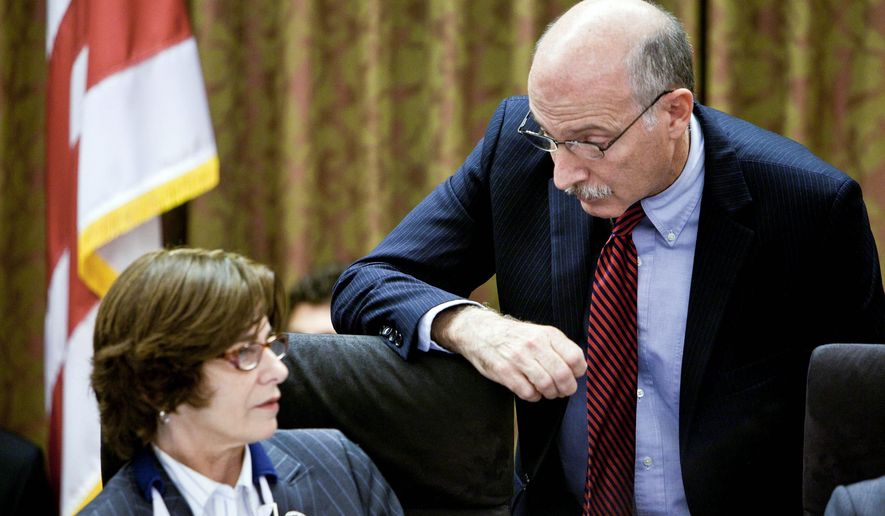The D.C. Council approved an income-tax increase on the city’s highest earners on Tuesday, after a proposal dismissed in the spring was revived during closed-door negotiations and hotly debated by council members returning from summer recess.
Council member Phil Mendelson, at-large Democrat, led the charge in raising the highest tax bracket from 8.5 percent to 8.95 percent on households making more than $350,000 per year. Currently, all households earning more than $40,000 annually are taxed at the 8.5 percent rate.
Only Hawaii, California, Iowa, New Jersey and New York have higher income-tax rates for their highest earning residents, according to the Tax Foundation, a D.C.-based nonpartisan tax-research group.
The council also voted to let the new rate, which affects roughly 7,000 filers, sunset after four years.
The tax, approved by a 7-6 vote in the council’s first legislative session after a two-month layoff, took a complex route to passage after hours of debate at the John A. Wilson Building that included biblical metaphors, a theatrical shredding of legislation and a failed 11th-hour resolution by the tax hike’s biggest critic.
The measure is expected to raise about $17 million in its first year and $106 million over four years. It also forestalls a controversial measure to retroactively tax residents on out-of-state bonds purchased before Jan. 1, 2012.
Council member Mary M. Cheh, Ward 3 Democrat, offered the decisive vote in favor of the tax hike after her sunset provision passed the council. She joined five co-sponsors on the income tax hike bill with Mr. Mendelson, yet allowed him to provide the most vocal support for the measure.
“Neither of these choices is good,” Mrs. Cheh, whose constituents are among the city’s wealthiest, said of the income-tax hike and the retroactive bonds tax. “Both are bad, and one is worse than the other.”
D.C. Council Chairman Kwame R. Brown has consistently rejected talk of any income-tax increases, yet he could not find the votes to hold off the latest proposal that surfaced overnight appeared to catch some members off-guard at a pre-meeting breakfast.
“I held steady against it,” Mr. Brown said. “People have an opportunity to vote the way the want to vote. It’s unfortunate, because I think we had the opportunity to take some time and see if we can work out the municipal bonds [issue].”
Mr. Brown said all the members’ comments, however, suggested they take fiscal responsibility seriously.
The chairman has said sound fiscal policy is his No. 1 priority and advised against using $89 million from the September revised-revenue estimate, because it’s one-time money and must be used to restore the city’s fund balance.
The debate on Tuesday marked a continuation of discussions that dominated budget talks in spring and early summer, after Mayor Vincent C. Gray proposed an income-tax increase on households that make more than $200,000.
A spokeswoman for the mayor said Tuesday night that Mr. Gray “welcomes the action taken by the Council, which reaffirms his position that revenue enhancements should be shouldered by those who have the means to do more.”
After extensive wrangling, the council voted to instead tax interest earned by D.C. residents on out-of-state bonds for the first time in the city’s history. However, the council set aside $13.4 million in expected revenue to delay the imposition of the bonds tax for one year.
Mr. Gray used a pocket veto — declining to sign the measure and letting it expire in August — to make the bonds tax effective this year and to restore the $13.4 million back into the fund balance.
David A. Catania, at-large independent, said the city’s budget has been growing, rendering false the idea that the District was in the type of financial crisis that states across the nation are experiencing and was in need of higher taxes to build revenue in lieu of spending cuts.
“What is remarkable about this is the utter abdication of leadership by our mayor,” Mr. Catania said, noting the administration used the pocket veto instead of finding $13 million in the budget to cover the bonds tax.
Mr. Brown and Mr. Catania supported a last-minute proposal by council member Jack Evans, Ward 2 Democrat, that would have restored the council’s earlier decision to delay the bonds tax by one year.
The maneuver, which the council rejected in a 7-6 vote, could have forced the council to gather enough votes to override a second veto by Mr. Gray.
Mrs. Cheh, who serves as Mr. Brown’s chairman pro tempore, or second in command, cast the final and decisive vote in defeating Mr. Evans’ proposal. She said her decision should not be read as an indication of how loyal she is to the chairman.
“I’m not anybody’s right hand,” she said. “We’re not partners in government, we’re not like twins, I’m not a butler, or maid or hand-holder. When it comes down to voting on something, I’m going to vote how I think I should vote.”
Mrs. Cheh had been particularly troubled by any retroactive bonds tax and — even before Mr. Gray’s veto had toyed with a “Plan B” that included an income tax on a higher level of earners than the $200,000-plus segment proposed by the mayor.
“I was boxed into a corner because of the way things unfolded,” she said.
• Tom Howell Jr. can be reached at thowell@washingtontimes.com.




Please read our comment policy before commenting.